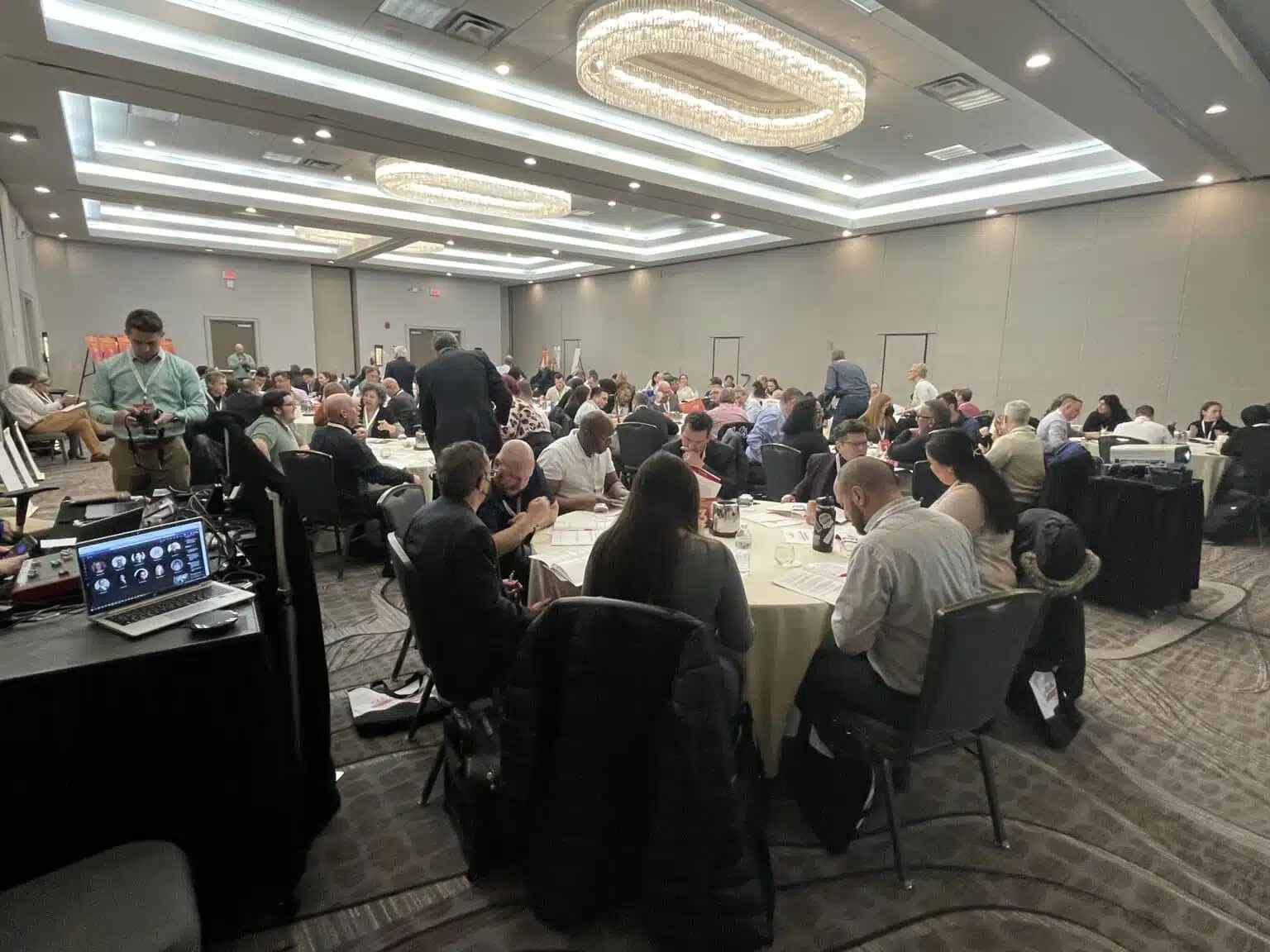At CROSS-SILO Regenerative Architects, we bridge silos within and between organizations, building the collaborative networks needed to regenerate value and multiply impact.
In a world where complexity and silos hinder progress, we partner with organizations to navigate challenges, align teams, and amplify their collective impact. Through strategic foresight, actionable insights, and hands-on execution, we help you turn obstacles into opportunities.
Here’s how we address the pain points you face and deliver transformative results:
- Bridging Organizational Divides – Disconnected teams, departments, or external partners are one of the biggest barriers to organizational success. We focus on uniting efforts, fostering alignment, and creating structures that enable seamless collaboration across silos.
- Navigating Complexity – Today’s organizations face constant change and uncertainty. Complexity is no longer something to avoid—it’s something to embrace. We guide your organization to make sense of the chaos and transform complexity into a competitive advantage.
- Building Resilience and Adaptability – Resilience and adaptability are the cornerstones of thriving organizations. We help you build systems and cultures that are both robust and flexible, enabling you to stay strong under pressure while evolving for the future.
- Amplifying Collective Impact – Impact is amplified when everyone moves in the same direction. We help you align stakeholders and leverage partnerships to create value that extends beyond organizational boundaries.
- Driving Ethical and Responsible Growth – Growth should be both ethical and impactful. We guide you to balance short-term profitability with long-term purpose, ensuring success that benefits everyone involved.

1. Bridging Organizational Divides
Disconnected teams, departments, or external partners are one of the biggest barriers to organizational success. We focus on uniting efforts, fostering alignment, and creating structures that enable seamless collaboration across silos.
The Pain:
- Teams working in isolation, duplicating efforts, or competing for resources.
- Misaligned goals leading to inefficiencies, mistrust, and missed opportunities.
- Lack of communication slowing down decision-making and innovation.
The Remedy:
- We uncover the root causes of silos—structural, cultural, or strategic—and craft tailored solutions.
- We create shared understanding, common goals, and open lines of communication.
- By aligning processes and systems, we enable seamless collaboration across functions.
The Gain:
- Unified teams working smarter together, not harder apart.
- Faster decision-making and streamlined operations.
- A culture of trust, collaboration, and innovation.
2. Navigating Complexity
Today’s organizations face constant change and uncertainty. Complexity is no longer something to avoid—it’s something to embrace. We guide your organization to make sense of the chaos and transform complexity into a competitive advantage.
The Pain:
- Overwhelmed by fast-changing markets, technological shifts, or regulatory pressures.
- Struggling to identify the bigger picture amidst daily operational chaos.
- Reactive decision-making that leads to short-term fixes but long-term vulnerabilities.
The Remedy:
- We map out the interdependencies and blind spots in your organization.
- We design frameworks that allow you to anticipate and adapt to change.
- We guide leadership teams to make proactive, data-driven decisions.
The Gain:
- Clarity and confidence in navigating uncertainty.
- A proactive organization that sees opportunities where others see challenges.
- Resilience to external disruptions and internal misalignment.
3. Building Resilience and Adaptability
Resilience and adaptability are the cornerstones of thriving organizations. We help you build systems and cultures that are both robust and flexible, enabling you to stay strong under pressure while evolving for the future.
The Pain:
- A rigid organization that struggles to pivot when faced with unexpected changes.
- Burnout and inefficiencies caused by reactive firefighting.
- Over-reliance on outdated processes or systems that can’t scale.
The Remedy:
- We strengthen your organizational design, so you’re prepared for what’s next.
- Our hands-on approach ensures your teams can pivot quickly and effectively.
- We align your operations to balance short-term performance with long-term viability.
The Gain:
- Confidence in tackling challenges head-on.
- A culture of agility that embraces change.
- Sustainable growth that’s built to last, not just survive.
4. Amplifying Collective Impact
Impact is amplified when everyone moves in the same direction. We help you align stakeholders and leverage partnerships to create value that extends beyond organizational boundaries.
The Pain:
- Misaligned or competing stakeholder interests diluting impact.
- Inability to leverage partnerships or networks effectively.
- Negative consequences from overlooked social or environmental responsibilities.
The Remedy:
- We create shared visions that align the efforts of your internal teams and external partners.
- By leveraging complementary strengths, we amplify outcomes that matter.
- We integrate sustainability and accountability into every step of your strategy.
The Gain:
- Enhanced reputation and trust among stakeholders.
- Measurable, positive impact that resonates beyond your organization.
- A network of partners working together for greater collective success.
5. Driving Ethical and Responsible Growth
Growth should be both ethical and impactful. We guide you to balance short-term profitability with long-term purpose, ensuring success that benefits everyone involved.
The Pain:
- A growth model that prioritizes profits at the expense of long-term sustainability.
- Pressure from stakeholders to address environmental, social, or governance (ESG) concerns.
- A lack of clarity on how to balance short-term wins with long-term purpose.
The Remedy:
- We design systems that fairly reward everyone contributing to your success.
- We help you internalize social and environmental considerations, ensuring they’re part of every decision.
- Our approach ensures short-term profitability supports, rather than undermines, your long-term vision.
The Gain:
- A business model that’s as fair as it is profitable.
- Strengthened relationships with customers, employees, and communities.
- Growth that’s sustainable, ethical, and purpose-driven.
Why CROSS-SILO Strategic Counselors?
- Custom-Tailored Solutions: No templates—just strategies designed for your unique needs.
- Hands-On Execution: We stay involved from concept to completion, ensuring real results.
- Impact-Driven Approach: Every recommendation aligns with your purpose, stakeholders, and long-term goals.
Ready to Cross the Divide? Let’s tackle complexity together, bridge your divides, and create a future of shared success. Contact us to learn how CROSS-SILO Strategic Counselors can help your organization thrive.

A UNIFIED APPROACH TO SYSTEMIC CHANGE
A staggering 80% of organizations fall short of their ambitious revenue and profitability growth targets. But what’s behind this widespread shortfall? McKinsey’s research points to a revealing insight: the likelihood of transformation success plummets to just 10% without a comprehensive, unified strategy. At the heart of many of these failures lies a critical, often overlooked culprit: the deficit of cross-functional collaboration.
In times of declining profits or stagnating revenue, the instinctive reactions are often to implement quick fixes: slashing costs, dismissing underperformers, boosting sales incentives, shifting target demographics, tweaking product features, overhauling marketing strategies, or rushing towards digital transformation. Yet, what if these surface-level solutions miss a deeper, more systemic issue?
Consider the organizational landscape, segmented into silos, each with its distinct culture, language, and set of norms. These divisions foster an environment where departments view each other more as rivals than allies, erecting barriers and obstructing the seamless exchange of ideas and information.
Reflect on this simple yet telling observation: how often do we see team members from different departments sharing a meal? This seemingly trivial act is a litmus test for an organization’s broader culture of collaboration. If individuals from diverse areas are hesitant to share a table, how likely are they to freely exchange knowledge and insights?
Thus, before you leap toward the next promising venture or quick fix, addressing and mending these foundational cracks is crucial. Building bridges between silos, encouraging open dialogue, and fostering a culture of horizontal collaboration are not just beneficial but essential steps toward unlocking the full potential of your organization.
By doing so, you not only enhance operational efficiency but also create a fertile ground for innovation, resilience, and sustained growth. Let’s shift our focus from merely fixing what’s immediate to healing what’s fundamental, ensuring our organizations are primed for success in a collaborative, interconnected world.












